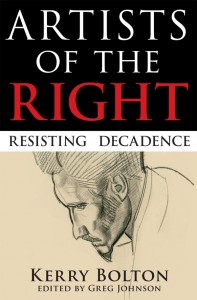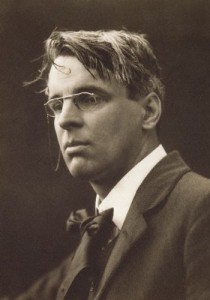Remembering William Butler Yeats:
June 13, 1865–January 28, 1939
Greg Johnson
785 words
William Butler Yeats, the Irish poet, playwright, and politician, was born on this day in 1865. One of the greatest literary figures of the 20th century, Yeats’ life and work straddle the great divide between Romanticism and Modernism. He received the Nobel Prize for Literature in 1923.
In life and in art, Yeats rejected modern rationalism, materialism, and egalitarianism. He saw them as coarsening and brutalizing.
Spiritually, Yeats was drawn to mysticism and the occult, influenced in particular by Emanuel Swedenborg and William Blake. Politically, like so many great literary artists of the first half of the twentieth century, Yeats was drawn to fascism. To learn more about Yeats’ life, art, and politics, see the following works on this site:

You can buy Kerry Bolton’s Artists of the Right here.
- Kerry Bolton, “W. B. Yeats” (from Artists of the Right)
- Jonathan Bowden, “W. B. Yeats.”
- Nicholas R. Jeelvy, “Jonathan Bowden’s Reactionary Modernism.”
- Greg Johnson, “Yeats’ Pagan Second Coming” (Translations: French, German, Spanish)
- Vic Olvir, “William Butler Yeats: A Poet for the West.”
- James J. O’Meara, “Artist and Autist: Cowley in the Light of Neville, Part 2)
- George Orwell, “W. B. Yeats as Occult Fascist.”
Here is Yeats’ poem “Under Ben Bulben.” In 1995 the British band In the Nursey released a recording of Colin Wilson reading most of Yeats’ “Under Ben Bulben” and set to music, and it was included on their tribute album to Colin. The song is entitled “The Painter,” and can be heard here.
UNDER BEN BULBEN
I
Swear by what the Sages spoke
Round the Mareotic Lake
That the Witch of Atlas knew,
Spoke and set the cocks a-crow.
Swear by those horsemen, by those women,
Complexion and form prove superhuman,
That pale, long visaged company
That airs an immortality
Completeness of their passions won;
Now they ride the wintry dawn
Where Ben Bulben sets the scene.
Here’s the gist of what they mean.
II
Many times man lives and dies
Between his two eternities,
That of race and that of soul,
And ancient Ireland knew it all.
Whether man dies in his bed
Or the rifle knocks him dead,
A brief parting from those dear
Is the worst man has to fear.
Though grave-diggers’ toil is long,
Sharp their spades, their muscle strong,
They but thrust their buried men
Back in the human mind again.
III
You that Mitchel’s prayer have heard
`Send war in our time, O Lord!’
Know that when all words are said
And a man is fighting mad,
Something drops from eyes long blind
He completes his partial mind,
For an instant stands at ease,
Laughs aloud, his heart at peace,
Even the wisest man grows tense
With some sort of violence
Before he can accomplish fate
Know his work or choose his mate.
IV
Poet and sculptor do the work
Nor let the modish painter shirk
What his great forefathers did,
Bring the soul of man to God,
Make him fill the cradles right.
Measurement began our might:
Forms a stark Egyptian thought,
Forms that gentler Phidias wrought.
Michael Angelo left a proof
On the Sistine Chapel roof,
Where but half-awakened Adam
Can disturb globe-trotting Madam
Till her bowels are in heat,
Proof that there’s a purpose set
Before the secret working mind:
Profane perfection of mankind.
Quattrocento put in paint,
On backgrounds for a God or Saint,
Gardens where a soul’s at ease;
Where everything that meets the eye
Flowers and grass and cloudless sky
Resemble forms that are, or seem
When sleepers wake and yet still dream,
And when it’s vanished still declare,
With only bed and bedstead there,
That Heavens had opened.
Gyres run on;
When that greater dream had gone
Calvert and Wilson, Blake and Claude
Prepared a rest for the people of God,
Palmer’s phrase, but after that
Confusion fell upon our thought.
V
Irish poets learn your trade
Sing whatever is well made,
Scorn the sort now growing up
All out of shape from toe to top,
Their unremembering hearts and heads
Base-born products of base beds.
Sing the peasantry, and then
Hard-riding country gentlemen,
The holiness of monks, and after
Porter-drinkers’ randy laughter;
Sing the lords and ladies gay
That were beaten into the clay
Through seven heroic centuries;
Cast your mind on other days
That we in coming days may be
Still the indomitable Irishry.
VI
Under bare Ben Bulben’s head
In Drumcliff churchyard Yeats is laid,
An ancestor was rector there
Long years ago; a church stands near,
By the road an ancient Cross.
No marble, no conventional phrase,
On limestone quarried near the spot
By his command these words are cut:
Cast a cold eye
On life, on death.
Horseman, pass by!
Share your own favorite Yeats poems below.
* * *
Counter-Currents has extended special privileges to those who donate $120 or more per year.
- First, donor comments will appear immediately instead of waiting in a moderation queue. (People who abuse this privilege will lose it.)
- Second, donors will have immediate access to all Counter-Currents posts. Non-donors will find that one post a day, five posts a week will be behind a “Paywall” and will be available to the general public after 30 days.
- Third, Paywall members have the ability to edit their comments.
- Fourth, Paywall members can “commission” a yearly article from Counter-Currents. Just send a question that you’d like to have discussed to editor@counter-currents.com. (Obviously, the topics must be suitable to Counter-Currents and its broader project, as well as the interests and expertise of our writers.)
To get full access to all content behind the paywall, sign up here:
Paywall Gift Subscriptions
 If you are already behind the paywall and want to share the benefits, Counter-Currents also offers paywall gift subscriptions. We need just five things from you:
If you are already behind the paywall and want to share the benefits, Counter-Currents also offers paywall gift subscriptions. We need just five things from you:
- your payment
- the recipient’s name
- the recipient’s email address
- your name
- your email address
To register, just fill out this form and we will walk you through the payment and registration process. There are a number of different payment options.
Remembering%20William%20Butler%20Yeats%3A%0AJune%2013%2C%201865%E2%80%93January%2028%2C%201939%0A
Share
Enjoyed this article?
Be the first to leave a tip in the jar!

4 comments
In “The Second Coming” the lines
“Mere anarchy is loosed upon the world,
The blood-dimmed tide is loosed, and everywhere
The ceremony of innocence is drowned;
The best lack all conviction, while the worst
Are full of passionate intensity.”
When I first read this poem (I was much younger, it was 1981) the lines that stood out the most were the last two: The best lack all conviction, while the worst are full of passionate intensity.
Those lines spoke to me of the insane social change that happened in the previous 20 years. I suppose you could say that social change was truly started in the 1940s after World War II, but the start was slow and couched in Christian terms of brotherhood, humanitarian terms of human rights and basic human decency. Who would have guessed it would have drowned so many innocents in a racial dystopia of busing, quotas, affirmative action, increased violence and rape, and the disturbing reality of a society that wants to degrade a more advanced people by siccing barbaric people on them. The worst integrationists and “anti-racists” were filled with passionate intensity about their sick cause, and the best — ordinary good people — were bewildered about what was truly right or wrong. Reality was turned on its head. The last sane person of good standing to oppose all of this was Carleton Putnam. The rest just folded in fear of the “moral” righteous hysteria. It wasn’t until Jared Taylor published “Paved With Good Intentions” in 1992 that I felt sanity might make a return to our sick society.
It’s become cliche to quote this poem or allude to it. However accurate it is…
Great poems are often quoted because they say something profound and accurate about life and about being human.
“Sailing to Byzantium”
Comments are closed.
If you have a Subscriber access,
simply login first to see your comment auto-approved.
Note on comments privacy & moderation
Your email is never published nor shared.
Comments are moderated. If you don't see your comment, please be patient. If approved, it will appear here soon. Do not post your comment a second time.